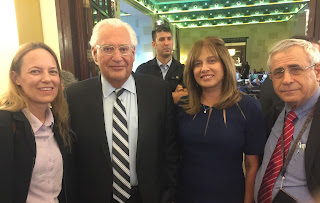Last week, Dr. Nan Greer gave us an
overview of the various international definitions of what it means to be an
indigenous people. We learned about Greer’s work in protecting the indigenous
rights of peoples as disparate as the Mayangna and Miskitú peoples, Native
Hawaiians and other ethnic groups on Hawai'i Nei, and the Cahuilla-Serrano
people of California. Now Greer is turning her energies toward legalizing the
indigenous rights of the Jewish people. To that end, Greer spent the summer of
2018 in Israel meeting with anyone she could to explain her mission and enlist
their assistance—people like Dr. Mordechai Kedar, Amb. Dr. Alan Baker, and Minister
of Justice Ayelet Shaked.
Here, Greer expands on her work on indigenous rights in Israel and abroad.
Judean
Rose: How did you become interested in indigenous land rights?
Nan Greer: As a child,
my parents were dedicated to helping those in poverty - specifically
children. As I grew up, I was taken
around the world by them, and introduced to different forms of charity,
community development, and community assistance. When of age, I worked with my
parents to form a family foundation dedicated to assisting those marginalized
in society.
As such, after
graduating from college, I traveled to Central America. While working there, I
was asked to visit marginalized indigenous communities in rainforest areas.
Upon meeting the Mayangna and Miskitú indigenous peoples, I was asked to assist
them in documenting and defending their rights to ancestral lands. From 1995
until the present, I have worked with these indigenous communities, including
on the first indigenous land rights case argued under international law (Awas Tingni vs.
Nicaragua). Working with the 9
territories of the Mayangna, and
other Miskitú territories in the BOSAWAS Biosphere Reserve, we established a
methodology of documenting the indigenous right to land under international law
- providing an example for other indigenous groups around the world.
 |
| Nan Greer at left during community meeting. |
While these methods are
shared worldwide, one particular indigenous group has continually been denied
support in this area. In fact, many have refuted the idea that Jews are
indigenous to their homelands. While Jews in Europe were once told to “go
home,” once home, Jews were then told to get out, as they were now considered
colonists. This is another terrible narrative obviously made up to reject the
rightful claim Jews have to their homelands, Israel.
Judean
Rose: How did you become interested in specifically Jewish indigenous land
rights?
Are you Jewish?
Nan Greer: I am not
Jewish. This year, I have applied for and been accepted into a Jewish Orthodox
conversion program. I was not baptized until I decided to do so under the
Episcopalian Church at age 13. I attended catholic schools from 6th grade until
graduating from my undergraduate school, Seattle University. While a
church-goer for some time, it wasn’t until I began reading the history of Jews,
their cultural, social, political, economic, and religious experience, that I
become fascinated with the Jewish religion.
I have come to reject
the racist theories of Christian replacement theology, in addition to the idea
espoused that Jews killed the Christ-figure - it is astounding that Catholic
popes only exonerated Jews of this “crime” in both 2015 and 2017, so recently.
During my time learning about Jewish connections to the lands of Israel, I have
come to reject other religious teachings, and favor those of the Jewish Modern
Orthodox religion.
Judean Rose: Can
you tell us about your work in Israel?
Nan Greer: A previous
student from my classes at Kaua`i Community College asked what I think about
the case of the Jews in Israel. We began talking about this in 2014, and by
2016 my previous student loaned me enough funding to allow me to travel to
Israel. How amazing it is that students can often become our teachers!
 |
| Noe Coleman - Current Nicaragua Indigenous Representative to MesoAmerican Group of Indigenous; leader, Matumbak - Mayangna meets with one of Greer's students at Kaua`i Community College. |
I arrived with my family
in December of 2016 and stayed through mid-January 2017. During this trip, I
interviewed various individuals dedicated to protecting the lands of Israel. I
began to examine the case of Jews as indigenous under the structure of
international law. I was surprised as to how marginalized they had become under
international structures that were dedicated to protecting indigenous
populations such as the Jews.
Since my travel to
Israel in 2016 and 2017, it has become apparent that other ethnic groups, specifically
Arab-Muslim groups, are pressuring the international community to reject the
indigenous status of the Jewish people, both in international and national law.
Many cases have arrived at the Israeli Supreme Court, without proper legal
documentation/evidence of legal right, that have caused the Israeli government
to remove their own Jewish people from the lands of their forefathers. This has
happened repeatedly in Judea and Samaria, with additional pressure on areas of
East Jerusalem, such as the community of Ramat Shlomo. This is a violation of
the rights of Jewish indigenous people, with a potential of permanent damage
and loss of critical land long recorded as Indigenous.
With abundant
archaeological data, literature and historical records, in addition to the
obvious maintenance of distinct Jewish culture, religion, and socioeconomic
forms, it is apparent the Jewish people of Israel are afforded legal protection
as a people under international law - a protection that is not being upheld
currently. Assisting the Israeli government to self-declare the Jewish people
indigenous, and to sign the UNDRIP (Declaration of the Rights of Indigenous
People) with reservations, is an enormous first step in protecting the right of
Jewish indigenous to their own lands, culture, religion, history, and
maintenance as a people, in perpetuity. With the historical onslaught against
their ethno-religious group, Jews have been discriminated against for several
millennia. As the global community furthers legislation protecting culture
groups around the world, there is a clear demand to protect the Jewish people -
there are more than 6 million reasons why this is important.
 |
| Nan visits the Knesset to stump for Jewish indigenous land rights. |
Among the experiences of
the Jews is a multi-generational response to discriminatory attack. As many other
indigenous communities’ experience, depression is a common affliction passed
from one generation to the next. While this may be some of the experience of
the Jewish people, they stand resilient in the face of their past, recreating a
miraculously developed nation state in only the past 70 years - with a large
number having returned, rejoining their small minority of permanent residents
in Israel, to repatriate their lands after two thousand years, restore their
spoken Hebrew language, and to reinvigorate their ancestral culture in their
homelands, and the birthplaces of their forefathers.
While not all in the
international community recognize their astounding resilience and
recapitulation as a people, Jews are truly an example to the world of cultural
survival, protecting cultural diversity in a world often devoid of such
distinctions. Were we not to protect the Jewish people at such a juncture, we
would fail humanity, and further the vicious anti-Semitic campaigns set out in
history at various times, annihilating those who have led the world
religiously, culturally, and environmentally. Not protecting the Jewish people
is simply not acceptable under human rights, and humanity at its base.
 |
| A radiant Nan after visiting the Temple Mount |
Judean
Rose: What has been the response of Israeli leadership to the idea of declaring
the Jewish people the indigenous people of Israel?
Nan Greer: Many people
in the Israeli government have been supportive of declaring Jews indigenous to
Israel. However, many also have challenged this, stating national sovereignty
is sufficient to protect the Jewish people. I disagree with this.
While other ethnic
groups in this geographical locale have gone to the United Nations, introducing
various motions and resolutions to condemn Israel, great pressure has been put
upon Israel by the international community, a community that has not had the
benefit of truly examining the Jewish indigenous case. Due to the lack of
engagement in international circles such as the UN, Jewish people have not had
their rights protected under international laws focused on protecting
indigenous people, such as the UNDRIP - the United Nations Declaration of the
Rights of Indigenous People. It is imperative that the international community
recognize the Jewish people as indigenous, that Jews are afforded protection
under international law designed to protect such traditional people. To deny
any indigenous status in the land of Israel to the Jewish people is
anti-cultural, anti-historical, and anti-religious under international law.
 |
| Nan meets with US Ambassador to Israel David Friedman, Tammy Friedman, and Dr. Mordechai Kedar |
Judean Rose: You
teach at Redlands University in California. What do you teach there and what
has been the response of your students and colleagues to your work on behalf of
Israel? Do they know about your work for Israel?
Nan Greer: I am an
adjunct lecturer at the University of Redlands where I teach cultural and
environmental anthropology, in addition to indigenous land rights. I have an
ethnically diverse group of young students dedicated to learning. However,
often times these students, as in other universities around the United States,
are taught narratives to believe, rather than how to think. As such, many of my
students have been misinformed about the Jewish people. While several of my
students are Jewish, these unique individuals often do not identify themselves
as such for fear of mistreatment and discrimination.
In fact, I commonly find
out their Jewish affiliation at the end of the semester, or privately after
classes. I am astounded as to the consistent fear of Jewish students in a
learning environment that purports to be all inclusive - as my own experience
and evidence suggests (as documented in numerous publications), these unique
students suffer anti-Semitism, ethno-religious rejection, and ridicule, these
very students must be protected and strengthened in their incredible identity
and uniqueness.
Judean Rose: What
are your impressions of Israel and the Israeli people, particularly during your
most recent stay here over the summer? Could you ever move to Israel?
Nan Greer: Both my
daughter and I want to stay in Israel and live here permanently. We are very
sad about having to leave. We are however, planning on finishing our conversion
to Judaism and making Aliyah when
possible. If ever there was an opportunity to move to Israel prior to this, I
am certain we would take it!
We have lots of ideas, but we need more resources to be even more effective. Please
donate today to help get the message out and to help defend Israel.





































